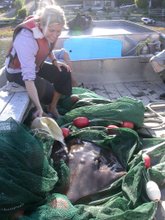
Basking sharks (Cetorhinus maximus) are the world’s second largest shark, reaching up to 12.2 metres long. These gentle giants are filter feeders and feed on tiny animals called plankton. Basking sharks were once abundant in BC waters and the population was thought to migrate between waters off California and BC. However, numbers greatly declined between 1940 and 1970 as sharks were entangled in fishing gear, part of a directed fishery and targeted in an eradication program. By the 1970s basking shark sightings were rare along the coast of BC, estimated that the decline from pre-exploited numbers exceeds 90%.

Basking sharks were listed as endangered by the Committee on the Status of Endangered Wildlife in Canada (COSEWIC) in 2007. In March 2010, the basking sharks were scheduled under the Species at Risk Act (SARA) and now receive legal protection. This protection makes it illegal to kill, harm, harass, and disturb these sharks. In addition, experts are working towards a recovery strategy over the next year that will outline research and actions that need to be achieved to ensure the recovery of these gentle giants.
Do you want to help basking sharks on their road to recovery? Well here’s what you can do! Fisheries and Oceans Canada are leading a sightings network for basking sharks. If you see a basking shark in BC waters go to the following website to report your sighting http://www.pac.dfo-mpo.gc.ca/SharkSightings or call the shark line toll free at 1-877-50-SHARK (1-877-507-4275).







No comments:
Post a Comment